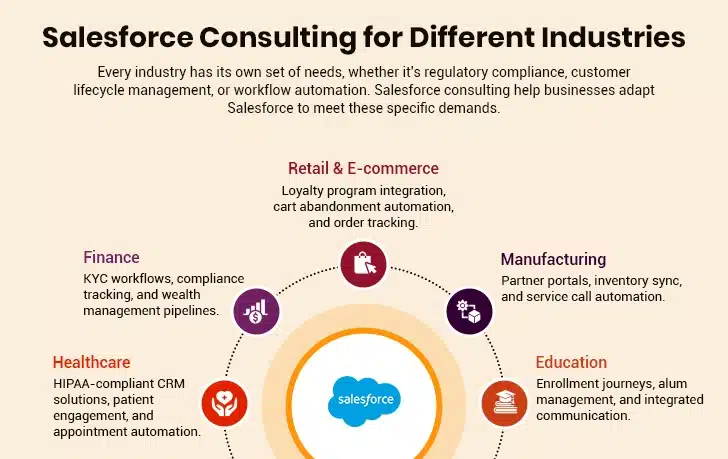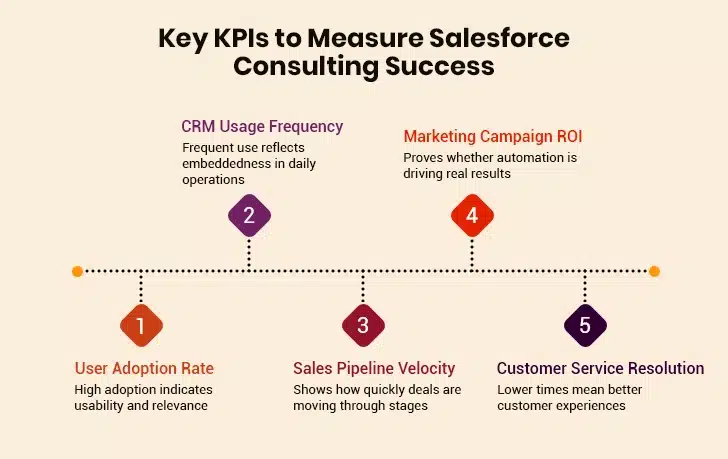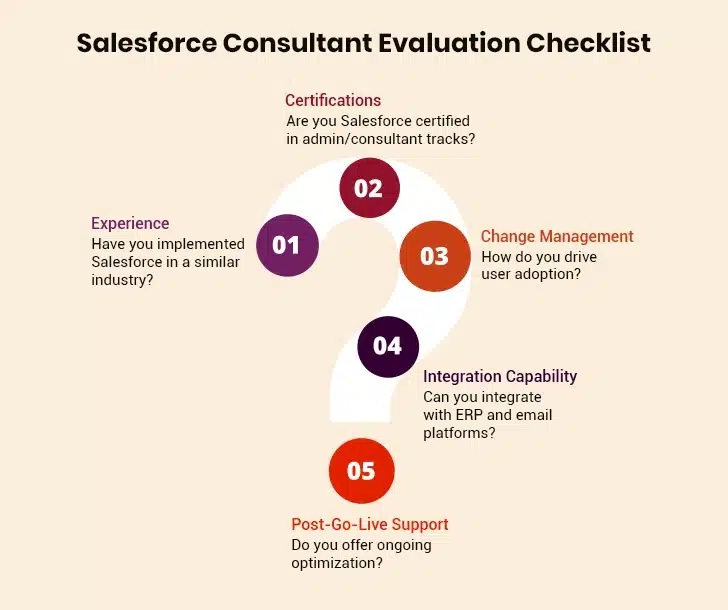“A tool is only as good as the hands that wield it.” That’s especially true for Salesforce.
Being one of the most powerful CRM platforms in the world, Salesforce comes with a multitude of functionalities, a diverse product suite, and tremendous flexibility in terms of customization. But this raw power isn’t enough. Businesses that rush in without a clear plan often find themselves lost in the maze of custom fields and broken workflows. What started as a dream of streamlined operations turns into a labyrinth of misconfigurations and underused features. Sound familiar?
This is where Salesforce consultation services come in—not just to ‘set up the tool,’ but to unlock its true potential. These experts bring clarity to the chaos. They connect your business goals with Salesforce’s deep capabilities.
In this blog, we’ll explore how expert Salesforce consultants help businesses like yours achieve CRM success and sustainable growth. From strategy to setup, from training to AI, here’s the whole story behind Salesforce consulting.
Table of Contents
How Salesforce Consultants Help Businesses Make the Most Out of CRM
Salesforce isn’t just another software platform—it’s a business enabler. However, to achieve real value, companies require more than just licenses and dashboards; they need expert guidance to utilize the system effectively. Reflecting this surge in demand, the global Salesforce consulting services market was valued at USD 18.30 billion in 2024 and is projected to reach USD 57.00 billion by 2032, growing at a compound annual growth rate (CAGR) of 15.4%. This growth underscores the critical importance of consulting services—not just for implementation, but for achieving long-term CRM success and maximizing return on investment (ROI). Here’s how Salesforce solution consultants help:
1. Aligning Salesforce with Business Goals
Salesforce consultants begin with alignment. They map your business objectives, whether it’s lead conversion, customer retention, or process efficiency, against Salesforce’s vast features. Instead of enabling every module unquestioningly, they tailor configurations to support your key performance indicators (KPIs). This ensures that every field, workflow, and dashboard in your CRM exists for a specific purpose. The result? A system that’s not just functional but strategic. Consultants become the translators between what your teams want and what Salesforce can do, avoiding feature bloat and focusing only on high-value outcomes. That’s how they keep the system lean, intelligent, and purpose-built for growth.
2. Boosting User Adoption Through UX and Training
No CRM succeeds if your people don’t use it. Consultants focus heavily on user adoption, starting with intelligent UX design. They declutter layouts, customize Lightning pages, and create intuitive navigation tailored to each role. By removing irrelevant fields and making key actions easy to access, they reduce friction. But it doesn’t stop at design. Consultants provide role-specific training sessions, onboarding materials, and in-app guidance using tools such as Salesforce In-App Guidance or WalkMe. They also gather user feedback and iterate on their designs.
3. Optimizing Reports and Dashboards for Decision-Making
“There is an increasing amount of pressure on business leaders to use data in today’s hyper-competitive environment,” said Southard Jones, Chief Product Officer of Tableau. “Yet, fragmented enterprise data and complex analytics tools are common obstacles leaders face that can significantly hinder confident decision-making.”
Data is only useful if it tells a story. Salesforce consultants help turn raw data into insights. They build custom reports and dynamic dashboards that reflect real-time performance, trends, and exceptions. Need to track win rates by region or identify top service reps? Consultants know how to structure reports using cross-filters, bucket fields, custom formula fields, and joined reports. They ensure leaders aren’t just buried in data—they get clear signals. By aligning metrics with strategy, consultants can more easily identify bottlenecks, track key performance indicators (KPIs), and make more informed decisions. A great dashboard can be a silent advisor in every meeting.
4. Taming Complex Business Rules with Declarative Logic
Not every company follows cookie-cutter processes. Some have approvals within approvals. Others have pricing rules that could give a rookie a headache. Salesforce solution consultants simplify this chaos by utilizing tools such as Flow, validation rules, and dynamic forms. They build logic that adapts to the way your business runs, without needing constant developer input. It’s like turning tribal knowledge into system intelligence. And because most of this logic is built declaratively, it’s easier to update over time. Consultants help you lock your complexity into Salesforce, so that your team doesn’t have to keep it all in their heads.
But not every requirement can be solved with clicks alone. Consultants often weigh the trade-offs between declarative (low-code) and programmatic (custom-code) approaches. Here’s a quick cheatsheet that shows how they choose the right path:
| Type | Tools Used | Use Case |
|---|---|---|
| Declarative | Flow Validation RulesPage Layouts | Auto-routing leads Calculating discounts Dynamic field visibility |
| Progmmatic | Apex LWC Triggers | Complex billing logicReal-time ERP syncMass data processing |
Competent consultants know when to stick with drag-and-drop simplicity—and when to bring in custom code for edge cases. This balanced approach ensures that the system remains scalable, maintainable, and tightly aligned with business operations.
5. Making Salesforce Mobile-Friendly for Field Teams
In today’s hybrid world, business doesn’t just happen at desks. Reps close deals in cafes. Service techs update cases onsite. And managers approve quotes mid-flight. Salesforce consultants ensure your CRM works flawlessly on mobile devices. They customize the mobile app layout, add quick actions, and create records that are accessible offline. Everything is designed for fewer taps and faster actions.
When reps can log activity, schedule meetings, or scan business cards in seconds, adoption increases, and data becomes richer. Consultants turn mobile devices into more than just an extension-they become a full-fledged command center in your pocket.
6. Navigating Change Management with a Human Lens
People resist change-even when it’s good. Salesforce consultants understand that adoption is as much about emotion as it is about function. They help businesses manage transitions with empathy and understanding. From early stakeholder involvement to internal champions, they make sure people feel heard.
Consultants also provide phased rollouts, sandbox previews, and internal marketing strategies to ease anxiety. It’s not just about training-it’s about storytelling, support, and momentum. When users see Salesforce not as another burden, but as a better way to work, the magic begins.
7. Using Analytics and AI for Smarter Decisions
Data is powerful. But data with intelligence? That’s game-changing. Salesforce consultants unlock tools like Einstein Analytics, AI-driven predictions, and forecasting models that help you move from hindsight to foresight. Want to know which deals are likely to close? Or, which customers are at risk of churn?
Consultants set up predictive models and recommendation engines to deliver those answers. They integrate external data sources and fine-tune algorithms to reflect the nuances of your real-world data. Suddenly, Salesforce isn’t just storing data-it’s advising your next move. With AI, your CRM becomes less of a tool and more of a business partner.
Salesforce Consulting in Action: Common Use Cases
Every business uses Salesforce differently—consultants help you use it more effectively. From setup to optimization, they ensure the platform supports your growth. These use cases demonstrate what is possible with the proper guidance.
1. Custom Salesforce Configuration and Setup
Each business operates differently. Out-of-the-box CRM implementations hardly suit actual business needs. Salesforce consultation services help businesses in configuring Salesforce objects, page layouts, fields, and record types to align with their unique workflows. The consultants also deploy business logic through Flow, validation rules, and automation tools. From lead routing to opportunity scoring, every process is optimized for performance. Salesforce becomes a strategic asset-not just a generic database-when properly configured. Salesforce consultation services guarantee that all configurations facilitate day-one operation, compliance, and user preferences.
2. Sales Cloud Optimization
“We envision a future in which sellers are augmented by AI to help them drive selling efficiency, freeing up precious time to focus on their customers,”-MaryAnn Patel, SVP of Product Management at Salesforce.
Sales teams require more than contact management-they need a sales force, a powerful selling machine. Salesforce consultation services optimize Sales Cloud through customized opportunity stages, lead assignment rules, and AI-powered forecasting. Consultants also automate quoting workflows with CPQ, allowing reps to spend less time on administration and more time closing.
Dashboards offer up-to-date analysis of win/loss patterns and pipeline health. Salesforce consultation services also combine third-party applications to eliminate redundant entry. The result is a packed platform that accelerates sales cycles, enhances conversions, and fuels revenue growth. According to a recent Salesforce survey, 91% of small and medium-sized businesses using AI report a revenue increase. This demonstrates the immense power of optimized, AI-enabled sales operations.
3. Marketing Cloud Implementation
Marketing departments reap the benefits of innovative, automated campaigns. Salesforce consultation services ensure that Marketing Cloud implementations are done with a scalable architecture, ensuring optimal performance and flexibility. Consultants help businesses create responsive customer journeys, segmentation rules, and lead-scoring models. They also configure integrations with CRM data and third-party tools for a unified marketing strategy.
From dynamic content emails to real-time behavioral triggers, consultants build workflows that improve engagement. Salesforce consultation services also support compliance with GDPR and CAN-SPAM, ensuring your brand remains safe and your contacts remain responsive. The result is marketing that’s personal, measurable, and high performing.
4. Service Cloud Implementation for Customer Support
Customers demand quick, precise support. Salesforce consulting services help companies implement Service Cloud, automating case management, omnichannel routing, and AI-driven agent support. Consultants establish Service Level Agreements (SLAs), implement escalation routes, and customize service console layouts to enhance speed and simplicity.
Consultants also implement knowledge bases and chatbots for 24/7 support coverage. Automation resolves repetitive issues more quickly, freeing agents to focus on more complex cases. Salesforce consultancy ensures the platform provides consistent, measurable support experiences across various channels, including phone, email, live chat, and social media.
5. Salesforce Integration with External Systems
Most firms operate with multiple systems, including ERP, HRMS, email systems, and others. Salesforce experts connect these silos through integrating Salesforce with systems like SAP, QuickBooks, Outlook, and HubSpot. Consultants use REST APIs, middleware, and pre-built connectors to synchronize data in real-time.
Seamless integration provides users with access to relevant data in one location, eliminating redundancy. Salesforce advisory services guarantee your CRM is the center of your digital world, streamlining productivity and accuracy.
Maximize Salesforce ROI with Expert Configuration and Strategic Insights
6. Data Migration and Cleansing
Data migration to Salesforce can be complicated and hazardous if not handled with the assistance of experienced professionals. Salesforce consultation services oversee end-to-end data migration—from mapping fields and deduplication to validation and staging. Consultants utilize tools such as Data Loader, MuleSoft, or third-party ETL tools to validate clean, structured imports. Consultants eliminate duplicates, populate missing fields, and normalize data values to improve reporting accuracy.
After migration, consultants validate results with business users to confirm consistency. With Salesforce advisory services, companies bypass typical data challenges and start with a CRM that is already optimized to deliver results from day one.
7. User Role Hierarchy and Access Control
Effective management of users ensures data security and usability. Salesforce advisory services help establish effective role hierarchies, define sharing rules, and configure permission sets. Advisors determine who gets to view, edit, or delete records by department. For instance, a sales representative might only view their leads, whereas managers can see the entire team’s pipeline. They also enforce field-level security to safeguard sensitive information.
With Salesforce consultation services, organizations ensure safe collaboration and compliance with requirements, without unnecessarily complicating access. The outcome is a platform in which each user views precisely what they require, and nothing more.
8. Einstein AI Enablement
Artificial intelligence can take your CRM to the next level-provided it is put in place effectively. Consulting services help companies activate and train Einstein capabilities, including Lead Scoring, Opportunity Insights, and Forecasting. Consultants specify data readiness, calibrate algorithms, and tailor prediction models to the company context. They also perform bias testing and explainability for AI ethics. Salesforce consultation services ensure AI delivers value—surfacing suggestions, alerting to risks, and exposing upsell opportunities in real-time. This is not automation; it’s intelligent automation that learns and gets better.
Measuring Success After Salesforce Consultation
A successful Salesforce implementation isn’t just about go-lives and configured fields-it’s about measurable business impact. Once your Salesforce consultant has aligned the platform with your workflows, it’s time to track results.
Here are the key KPIs that signal a successful engagement:
How to Choose the Right Salesforce Consultant
Not all consultants are created equal. The right Salesforce expert can mean the difference between a smooth implementation and a costly misfire. Here are a few key factors to consider when evaluating potential Salesforce consulting partners:
Assess Technical and Functional Balance
Look for someone who can map high-level goals into Salesforce features without overengineering. The right Salesforce partner explains Apex logic and ROI models with equal ease. Ask about their past architecture designs, Flow configurations, or API integrations-but also how those choices impacted user adoption. A strong SFDC consultant thinks like both an admin and a business owner.
Check Salesforce Certifications and Credentials
Certifications aren’t everything, but they matter. They show that a consultant is serious about staying current with Salesforce. Salesforce consulting requires staying up to date with three major releases per year. A certified SFDC consultant understands platform limits, new features, and secure implementation practices. They also follow proper DevOps and sandbox strategies. Don’t just count badges-ask how they applied their learning in real-world scenarios. That’s where credentials become credibility.
Review Their Track Record and Client Feedback
Great Salesforce partners are transparent about wins and lessons learned. A dependable SFDC consultant won’t promise the moon. Instead, they’ll set realistic timelines, flag risks early, and deliver what matters most. Don’t just look at credentials-look at client outcomes. That’s the ultimate proof of quality.
Final Words
Salesforce is a powerful platform, but its actual value is unlocked when it is tailored to your unique business needs. That’s where Salesforce consultants‘ step in translating complex requirements into streamlined workflows, better data visibility, and more intelligent automation. Whether you’re optimizing Sales Cloud, integrating AI, or improving user adoption, the right consultation services ensure your CRM isn’t just functional-it’s transformational. In a competitive landscape, businesses that treat Salesforce as a strategic asset, not just a tool, are the ones that scale faster, serve customers better, and grow stronger.









